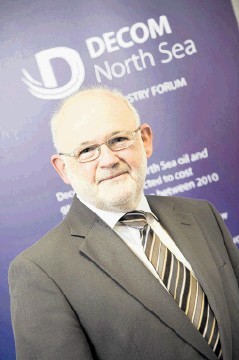
Securing approval for decommissioning programmes in the North Sea has apparently become more transparent, quicker and less costly thanks to a new standard template devised by a group of industry experts.
The standard decommissioning programme workgroup, set up by Decom North Sea (DNS), has devised a template that operators can use to seek approval for decommissioning work.
The workgroup has been developing the template since January this year and will feed directly into revised Department of Energy & Climate Change guidelines.
The template, upon which the wider industry has been consulted, will feed directly into revised DECC decommissioning guidelines.
Brian Nixon, CEO at DNS, said the template is a “great first example” of DNS members working collaboratively with government to deliver something that ought to make a big difference to industry’s ability to get decommissioning plans ratified more quickly and easily by DECC, so enabling smoother planning of decommissioning programmes and workloads in years to come.
The hope is that the UK offshore industry can adopt the template later this year.
Nixon said: “The workgroup is very enthusiastic about the opportunity to present a success story at the Offshore Decommissioning Conference in October.”
The conference, organised by Decom North Sea in partnership with Oil & Gas UK, will take place in St Andrews during October 9-11.
Stuart Heggie, MD of workgroup member Optimus Decom, said the standard form would streamline the preparation and approvals process, which will be crucial as decommissioning work starts to take off in the UK North Sea.
He described it as a clear win-win for all as operators now have a clear line of sight as to what specific information is requested of them, as well as what the cost of submission for approval will be.
DECC, in turn, will receive only the information that is relevant to consider the case, avoiding having to examine over-lengthy submissions and saving the operator cost and time in having to re-define their documents.
“Practically, there are likely to be significant costs savings arising from adopting the new template,” said Heggie.
“Previous decommissioning programmes have entailed proposal documents running into hundreds of pages; this form is significantly reduced, at the same time as being precise enough to fulfil the requirements of DECC.”
The workgroup comprises DNS, the Department of Energy and Climate Change (DECC), four operators, environmental consultancy GP Decom and engineering consultancy Optimus (Aberdeen), which recently formalised its involvement in decommissioning by creating the specialist subsidiary Optimus Decom.
Around 460 installations, over 10,000km of pipeline and more than 10,000 wells are set to be decommissioned in the UK North Sea over the next three decades, and just 7% of the anticipated work has been completed to date.
It is currently said that some £1billion is expected to be spent annually by 2015.